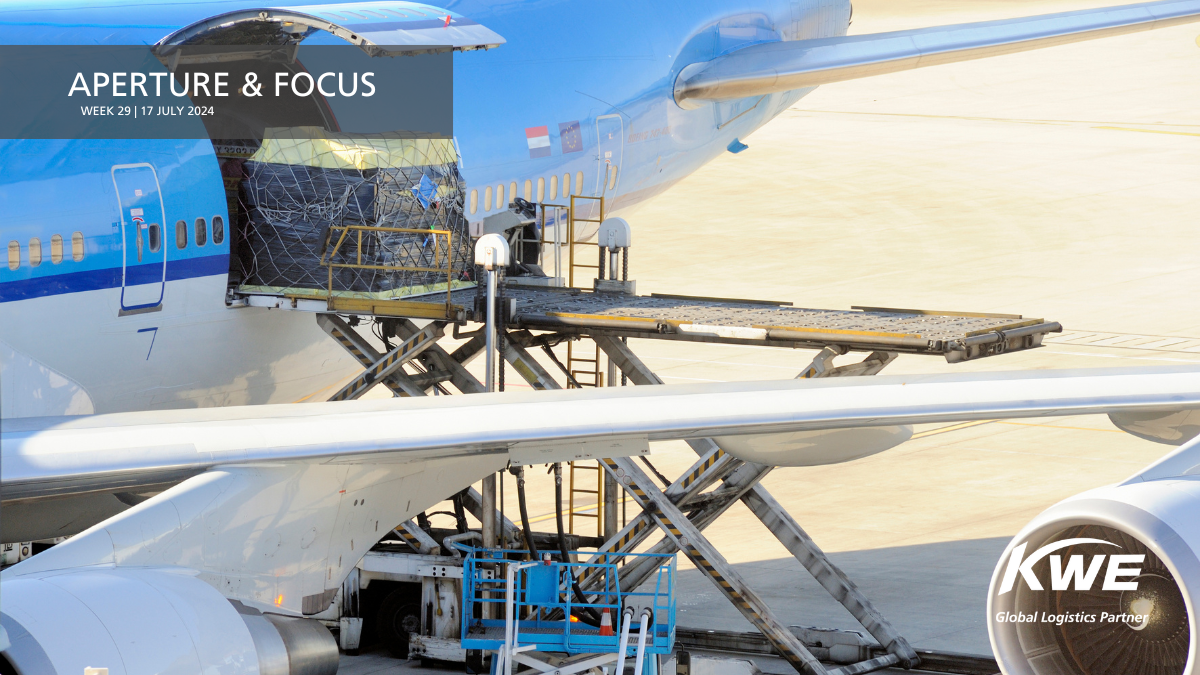Quote
Aperture & Focus: Week 29

Global Aperture
With peak season on the horizon and ongoing delays already tightening ocean capacity, container lines are becoming increasingly selective about the commodities they carry, imposing strict weight policies and hefty penalties for deviations, which could disrupt shipments of heavy goods from India to Europe. Amid strong booking demand and tightened cargo weight policies, major carriers have begun implementing surcharges and tightening booking criteria to optimize vessel loads.
Worldwide air cargo volumes saw a 5% decline during the first week of July compared to the prior week as growth slowed during US Independence Day celebrations. Despite this dip, volumes remain significantly higher year-on-year at 11% over the same week in 2023.
Ships sailing around the southern tip of Africa to avoid the turmoil in the Red Sea are now battling severe weather, as carriers report delays, lost and damaged vessels, and one ship running aground northwest of Cape Town. Ship tracking data shows that vessel operators are taking various measures including taking longer journeys and pausing their routes altogether until winter weather conditions stabilize.
Regional Focus
Americas
United States: US East and Gulf Coast port workers represented by the International Longshoremen's Association (ILA) are prepared to strike on October 1st if a new contract with the US Maritime Alliance (USMX) is not negotiated before the current one expires on September 30th. The ILA has remained firm on its demands that include limits on automation and outsourcing and refuses to extend the current contract or involve external agencies.
Brazil: Companies operating out of Brazil’s Manaus port have begun implementing low water surcharges as the area experiences what could be its worst drought in 10 years. These include charges implemented by carriers to cover affected routes and additional barge services to carry cargo from ships to the mainland when water levels prevent docking.
Asia-Pacific
India: Vizhinjam Port, India’s first deep-water transshipment port, began operations on July 12th upon the arrival of Maersk's Neopanamax vessel San Fernando. The port aims to handle 1.5 million TEUs annually and compete with hubs like Colombo and Singapore. Located in Kerala, near major shipping routes, the port features advanced technology and deep berths for large vessels, with plans to expand its capacity to 3 million TEUs by 2028.
Singapore: After a prolonged duration of unprecedented backlogs at Singapore’s terminals, Singapore’s largest terminal operator PSA reports that container terminal delays have been reduced to two days or less despite high vessel utilization and off-schedule arrivals due to Red Sea diversions. In the first half of 2024, container volumes increased by 7%, and vessel stays at berth rose by 22% due to larger ships and high rehandling requirements. PSA has improved operations by commissioning new berths, reactivating old ones, and hiring nearly 1,500 workers, although supply chain volatility continues.
Europe, Middle East & Africa
Germany: Germany’s Ver.di union will present two contract alternatives to its 11,000 port workers after failed negotiations with the Central Association of German Seaport Operators (ZDS). The labor dispute, which saw warning strikes staged in June and July, has caused significant port disruptions. The union will decide its next steps based on member feedback by late August.
Netherlands: The Supreme Court of the Netherlands has ruled that the plan to cut flight slots at Amsterdam Schiphol Airport was unlawful, affirming that any reduction in aircraft movements must comply with the European Union’s (EU) “Balanced Approach” procedure for noise management. This decision supports airlines and industry associations, ensuring that flight operations at Schiphol will not be reduced without following established international and EU regulations.